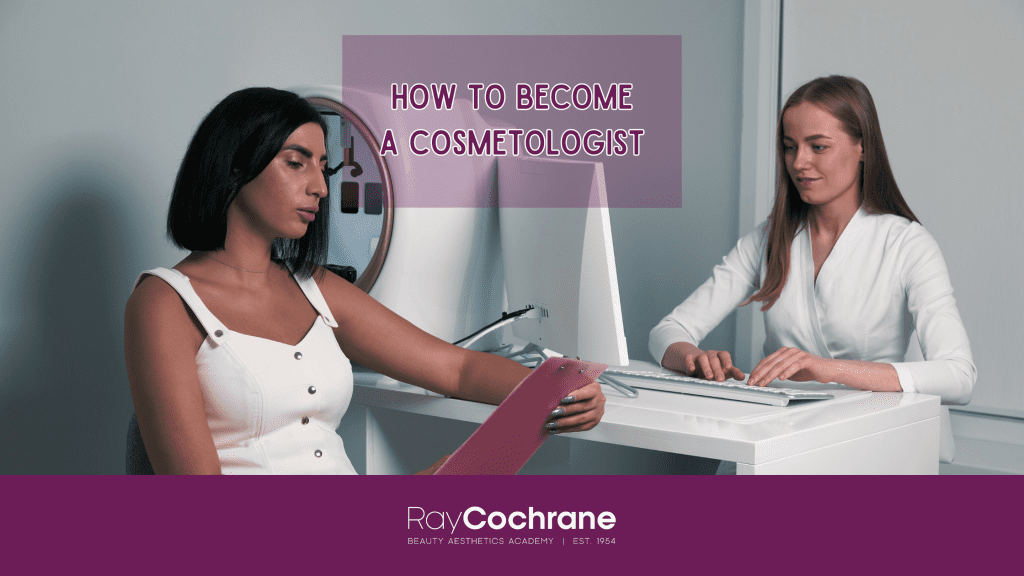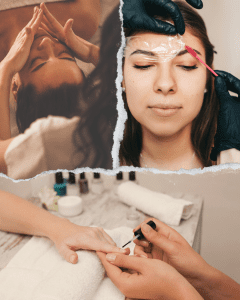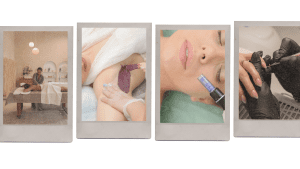
Do you have a passion for helping others look and feel their best? If so, a career as a cosmetologist/beauty therapist might be the perfect choice for you.
In this blog, we will cover all the basics you need to know about how to be a cosmetologist. Working as a cosmetologist offers a wide range of opportunities. Beauty treatments are always changing and evolving, so you will always have the chance to grow and advance in your career!
If you want to make a difference in people’s lives in a role where no two days are ever the same, read on to learn more about becoming a cosmetologist. There’s plenty to gain from what follows.
What are Cosmetologists?
Cosmetologists are trained professionals who provide a range of cosmetology treatments to enhance the appearance and improve the overall well-being of their clients.
These treatments may include facials, massages, waxing, nail care, and makeup application, among others.
Cosmetologists work in salons, spas, and other establishments, and their main goal is to help clients enhance their appearance and boost their self-confidence.
Difference between Cosmetologist and Beauty Therapist
It’s important to note that “beauty therapy” and “cosmetology” are essentially two sides of the same coin. They refer to the professional practice of enhancing one’s appearance and well-being through various cosmetic treatments. However, the choice of terminology may differ based on your location.
In Europe, including the United Kingdom, the term “beauty therapy” is commonly used to describe this field. It has deep-rooted traditions and is a well-established part of the beauty industry across the region.
Beauty therapists in the UK are known for their expertise in providing a wide range of beauty and personal care treatments to clients, ensuring they look and feel their best.
On the other hand, “cosmetology” is a term more frequently used in other parts of the world, including the United States. The principles and practices are essentially the same; cosmetologists provide a variety of cosmetic treatments, from hair and skincare to nail care and makeup application.
So, whether you’re considering a career in beauty therapy or cosmetology, you’re embarking on a journey to make people feel more beautiful, confident, and comfortable in their own skin. The choice of terminology depends on the region you’re in, but the passion for helping clients achieve their beauty and well-being goals remains a universal constant.
The Role of a Cosmetologist
As we previously mentioned, the role of a cosmetologist is to look after your client’s beauty and well-being by providing a range of cosmetology and personal care treatments. Your primary objective is to advise your clients about the most appropriate treatments based on their individual needs.
As a cosmetologist, you can provide various non-medical treatments for both the face and body, including:

-
Facials and Personalised Skin Care
-
Brow Shaping
-
Eye Lash Treatments
-
Waxing and Hair Removal
-
Massage Therapy
-
Manicures and Pedicures
Cosmetology treatments are only a small part of a cosmetologist’s role. You may also be in charge of checking and ordering inventory and health and safety measures. Typical responsibilities involve regular sanitisation of workstations and the sterilisation of used equipment.
The key to your success in the cosmetology and personal care sector is having the confidence to communicate professionally when advising on the best course of treatments. Your role is to ease your client’s anxiety or apprehension regarding treatments and give guidance to address their concerns. Aftercare advice is also part of most cosmetology roles, which often involves promoting and selling personal care products.
Delivering the results your clients expect will quickly build trust! Trust is the core reason why your clients will recommend you — a sure way to secure loyalty and grow your customer base.
Types of Cosmetologists
Most cosmetologists will train in a variety of skills, however, after completing your foundation qualifications, you have the opportunity to specialise in a number of areas.
Here is a list of the key specialisms you can pursue:
1) Massage Therapist
Massage therapy gives you the opportunity to relieve stress and improve health. As you advance, you can also work as part of a wider team, including osteopaths, chiropractors, and physiotherapists, to treat injuries and help people with chronic illnesses.
2) Facial Therapist
Providing facial treatments and skincare gives your clients an instant boost of self-confidence, which can be extremely rewarding.
3) Lash Technician
Specialising in cosmetology typically includes treatments such as lash extensions, eyebrow shaping, and makeup application.
4) Personal Care
Treatments such as body wraps, cellulite treatments, spray tans, and waxing can help clients look and feel their best selves.
5) Makeup Artist
Semi-permanent makeup is a very popular treatment that can transform the lives of daily wearers of makeup or people who struggle with makeup application.
6) Laser/IPL Hair Removal Technician
Laser and IPL hair removal are one of the fastest-growing cosmetology specialisms, which can also lead to a demand for non-surgical aesthetic treatments.
7) Non-surgical Aesthetician
As you develop your skills, you may want to progress to providing non-surgical cosmetology treatments. These types of treatments tend to focus on the face and neck, such as chemical skin peels and microneedling.
8) Nail Technician
Manicures, pedicures, and nail extensions are constantly evolving with new products and techniques, making this a fun and interesting area to focus on.

What is the Best Cosmetology Qualification?
With a baffling choice of qualifications and cheap cosmetology course options, knowing which qualifications you should take can be difficult.
Regardless of your chosen course, you should take a course accredited by an established cosmetology qualification provider such as VTCT.
Qualifications assessed by VTCT are recognized by the British Association of Beauty Therapy and Cosmetology (BABTAC) and the Federation of Holistic Therapists (FHT).
Level 2 Diploma in Beauty Therapy or Level 2 Facial Course Qualification are the cosmetology courses which are the foundation for a successful career as a cosmetologist. Which one is the best? That all depends on what you are most passionate about. If you want a more rounded beauty education, we recommend starting with the VTCT/NVQ Level 2 Beauty Therapy Diploma.. If you want to focus on skincare, and become a master in facial treatments, then theVTCT/NVQ Level 2 Facial Course is probably the best fit for you.
Upon completion, you will have the skills and knowledge you need to start working immediately and get insurance if you want to work as a self-employed cosmetologist. The VTCT accreditation is an internationally recognized Awarding Organisation and Examination Board, enabling students to work worldwide.
What Do You Learn in VTCT Level 2 Beauty Therapy Diploma?
1. Facials Massage and Skincare
You will learn the steps to performing massages and how to complete skin analysis. The skincare element will also cover various techniques such as cleansing, moisturizing, steaming, and spot extraction.
2. Lash Lift
Also referred to as eyelash perming, you will learn the practical method to provide this treatment safely.
3. Eyelash and Eyebrow Tinting/ Shaping
You’ll gain insights into analyzing facial features and skin tones to provide the best results. This ensures clients leave with beautifully framed eyes.
4. Waxing
To enable you to wax the face, bikini, and other areas of the body, you will be taught how to apply both hot wax and strip wax.
5. Nail Treatments
You’ll become proficient in delivering manicures and pedicures, two popular treatments. This training ensures you can provide well-groomed and polished nails, meeting the high demand for nail care services.
6. Health, Safety, and Hygiene
Knowing how to adhere to health, safety and hygiene regulations will enable you to provide safe treatments and maintain your work environment to high standards.
7. Client Care, Communication, Salon Reception Duties
This aspect is often overlooked, but it is critical to your success. Mastering effective communication and managing salon reception tasks is essential. You will learn how to communicate effectively and provide a high standard of service.
8. Consultation Techniques and Retail Skills
The ability to understand your client’s needs when providing consultations and retail services will be taught to ensure you have all the skills you need to succeed.
Note: Our Level 2 Facial Course consists of the same curriculum, excluding lash&brow services, waxing and nail treatments.
How to Become a Cosmetologist?
Career in cosmetology in the UK is an exciting journey filled with opportunities to bring out the beauty in others. In this step-by-step guide, we’ll walk you through the key phases, from education and skill development to building a successful career in the world of cosmetology.
Take a look at these 6 easy steps on how to become a Cosmetologist.
Step 1: Start Your Cosmetology Education
Begin your journey by enrolling in a cosmetology program, which can be found at beauty aesthetics academy and training centers..
Your journey into the beauty industry begins with choosing the right beauty therapy course at the leading beauty aesthetics academy.
Step 2: Skill Development
Next, you’ll focus on acquiring essential beauty skills such as body massage, facial electrotherapy, and body electrotherapy,skin care, and nail care. These practical skills are essential for your career.
Step 3: Hands-On Training
Put your knowledge into practice by working with real clients during your training. This hands-on experience is crucial for building your expertise.
Step 4: Certification
To work legally as a cosmetologist, you’ll need to obtain the appropriate certificate or license.
Step 5: Industry Knowledge
Stay informed about industry regulations and adhere to health and safety standards to ensure you’re operating within the legal framework.
Step 6: Career Building
As you progress, create a portfolio showcasing your work to demonstrate your skills to potential clients. Additionally, establish and expand your clientele base while networking within the industry to discover growth and advancement opportunities.
Why Choose Ray Cochrane Beauty Aesthetics Academy?
Here at Ray Cochrane Beauty Aesthetics Academy, we have been offering courses tailored for beginners, as well as experienced therapists looking to upskill, since 1954, making us the leading cosmetology school in London.
Yes, that’s 70 years! We are one of the longest established Beauty & Aesthetics Academies in the United Kingdom.
About Our Cosmetology/Beauty Therapy Courses
Our Beauty Courses are approved by VTCT, which means that our qualifications are accredited by OFQUAL (Office of Qualifications and Examinations Regulation) and therefore recognised by the beauty industry worldwide, insurance providers, and local councils.
Our school is based in the heart of London, Baker Street, and is easily accessible. We boast modern facilities, experienced tutors, and established partnerships with leading beauty brands.
After completing Level 2, you can progress as a cosmetologist by completing the VTCT/NVQ Level 3 Beauty Therapy Diploma, which includes anatomy and physiology, body massage, facial electrotherapy, and body electrotherapy. Completing this course will enable you to offer a wider variety of treatments and apply for higher-level positions as a fully-trained cosmetologist.
You can also explore taking both levels at the same time, to save you time and money by taking our VTCT Level 2&3 Combined Beauty Therapy Diploma, which will enable you to become a fully qualfied cosmetologist/beauty therapist in only 6 months.
You can further develop your skills by completing the VTCT Level 4 Certificate in Laser and IPL Treatments. This will allow you to perform in-demand laser and IPL treatments and qualify as a spa manager. Completing this course will increase your career prospects and potential earnings and give you the knowledge you need to run a successful cosmetology clinic.
If you can’t miss out on any trends, you should consider our VTCT Level 4 Certificate in Microblading course — a booming field amongst beauty treatments today. You will learn all the practical and theoretical knowledge to master the art of microblading and how to safely and correctly carry out microblading treatments on clients.
7 Tips to Become a Successful Cosmetologist
In addition to qualifications, several other factors will help you to be successful. Here are our top seven tips for retaining clients and receiving referrals.
1. Clean and Polished Appearance
Your appearance is the first impression you will give and should reflect the high standards of your business.
2. Excellent Customer Service
You should not only want to provide unsurpassed service to your clients, but your clients should also leave feeling they had the very best experience possible.
3. Empathetic and Understanding
Easing your clients’ worries and making them feel comfortable sharing their concerns is a vital part of the role.
4. Professional Attitude
Your appearance needs to be matched with a professional attitude to build trust, as well as gain recommendations and referrals.
5. Creative and Artistic
In the ever-changing world of beauty, you need to keep up with fashion and trends and use creativity to set yourself apart and deliver unparalleled service.
6. Time Management Skills
An important aspect of your role as a beautician is to balance several clients at once. This means you need to judge how long treatments will take and plan your schedule to ensure you finish in time for your next client.
7. Cosmetology Qualifications
Arguably, this is the most critical factor required to secure a position in a top establishment or build your business as a self-employed cosmetologist.
How Much Can You Earn as a Cosmetologist?
Understanding the financial aspects of a career is as important as knowing its practical elements. As an experienced and specialised cosmetologist, salary expectations can be much higher than the starting rate.
In the UK, an entry-level cosmetologist may start earning around £15k per year. But with more skills under your belt and building a solid client base over time, this figure could rise up to £30k or even higher.
You could also aim towards becoming self-employed where control over pricing gives way for increased profits.
Predictions indicate that the beauty industry is likely to experience a significant surge in growth. The National Careers Service suggests that there will be 29% more Hairdressers & Barbers jobs in 2024 in London.
This growth means you’ll likely have ample opportunities once you’ve completed your training at Ray Cochrane Beauty Aesthetics Academy.
With persistence and passion driving your journey into cosmetology – backed by our robust education – the sky truly is the limit.
Cosmetologist Career Opportunities
The beauty industry is fast-paced and growing, with new products, techniques, and technology developing year on year. Consequently, there are numerous career opportunities for trained cosmetologists.
1. The Travel and Spa Industry
As a qualified cosmetologist, you can work anywhere in the world. Cruise Ships and holiday resorts are well known for their spas and beauty services. Working in the travel industry is a popular choice for many cosmetologists as you can travel the world while developing your skills and advancing your career.
2. Film and Television
Working in film and television is not just focused on makeup and hair. Between filming, treatments such as facials, massages, and nail treatments are required. Working in film and television provides the opportunity to be part of a creative industry. You can also accompany a film crew on locations, often to unusual and exciting destinations, and play a vital role in the smooth running of the production.
3. Self-Employed Cosmetologist
You also have the option to work as a self-employed cosmetologist. This could be as a mobile beautician, hiring a room in a clinic, or providing treatments from your own home. Of course, you may choose to do a combination of all of these options. Becoming a self-employed cosmetologist is an excellent choice if you enjoy working alone and want complete control over your career development.
4. Working in a Cosmetology Clinic
Not everyone wants to be their own boss or work independently, and that’s ok! There are plenty of successful clinics around the country that are looking for talented cosmetologists. The benefit of working for an already established cosmetology clinic is the security of a salary and advancement in your career. If you are a social person and enjoy being part of a team, working with other experienced cosmetologists can also be a lot of fun!
Start Your Cosmetology Course Today
In conclusion, becoming a cosmetologist or beauty therapist offers a rewarding career path for those passionate about helping others look and feel their best.
By choosing the right beauty therapy course, aspiring cosmetologists can gain the necessary skills and qualifications to excel in the industry.
With hands-on experience, continuous learning, and building a strong portfolio, cosmetologists/beauty therapists can thrive in various settings, including salons, spas, and even as entrepreneurs.
The earning potential in this field is promising, with the opportunity for growth and higher salaries as skills and clientele expand.
By following these tips, you can set yourself apart and embark on a successful journey in the thriving field of beauty.
So, why wait? Simply get in touch with us today on 0203 856 8886 or fill in our online form for more information and make sure you don’t miss the next intake of our VTCT Level 2 Beauty Diploma Course.
FAQ’s
1. How long does it take to become a Cosmetologist?
The VTCT/NVQ Level 2 Beauty Diploma can be completed in as little as 12 weeks, whilst our level 2 Facial can be completed in 22 weeks. Critical to being prepared with the most up-to-date skills is the experience of your cosmetologist tutors.
2. Is science important in cosmetology courses?
Chemistry is involved in every aspect of the cosmetology field including hair, hair dying, and chemical reactions formed when blending chemicals. All beauty products are made from combinations of chemicals and fall into the field of chemistry.
